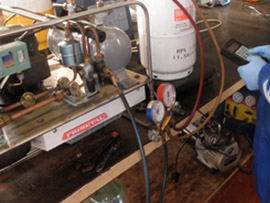Practical Refrigeration Training Centre
+44 (0) 1282 452152
Refrigeration, Air Conditioning and Electrical Training

Introduction
PRTC is approved by City and Guilds to assess candidates for the 2079 (F Gas) Refrigerant Handling qualification and either category 1 (charging and recovering for systems with more than 3 kg of refrigerant in them) or category 2 (charging and recovering for systems with less than 3 kg of refrigerant in them) may be taken.
The dates and prices are the same for either category but please let us know which you would prefer at the time of booking.
Holding a valid 'F Gas' qualification is mandatory for anyone handling F Gas refrigerants after July 2011.
Objective
To achieve the skills and knowledge necessary to obtain the City and Guilds 2079 (F Gas) refrigerant handling qualification in the category specified.
Methodology
Practical skills will be revised and practised on the first day. On the second day a presentation/talk-through will be followed by training in specific topics as required by the candidates and practice in completing the paperwork needed.
The assessment day will comprise a practical test demonstrating the skills listed below and an on-line, multiple choice question paper for the theory.
Synopsis
Theory - you will need to have an understanding of the following:
• Units of temperature, pressure, mass, density and enthalpy, including different states of refrigerant
• The basic theory of the vapour cycle and the use of pH diagrams
• The function of the major components, their performance and indications of leakage
• The operating conditions and efficiency of a system
• Azeotropic and non azeotropic refrigerants
• The GWP (global warming potential) of refrigerants
• Energy efficiency and ozone depletion, including the Montreal and Kyoto Protocols
• Identification of leakage points and the associated risks
• The legal requirements regarding the storage and transportation of refrigerants, oils and controlled wastes
• The documentation and records which need to be made and kept and how to complete them
• The hazards involved in handling refrigerants, oils and waste products
• The hazards involved in nitrogen pressure testing and flame brazing
Practical - you will need to demonstrate the following practical skills:
• Be able to braze and flare pipe
• Carry out and complete nitrogen pressure test
• Carry out and complete leak test direct and indirect
• Vacuum out system using vacuum gauge
• Prove system structure is sound and leak tight
• Charge system with non azeotropic refrigerants (over 3 kg for category 1)
• Prove system efficiency
• Produce commissioning document
• Complete a system log
• Recover refrigerant
• Drain oil from a compressor
• Produce waste documentation
• Ensure refrigerant traceability

 Practical Refrigeration Training Centre Limited
Practical Refrigeration Training Centre Limited